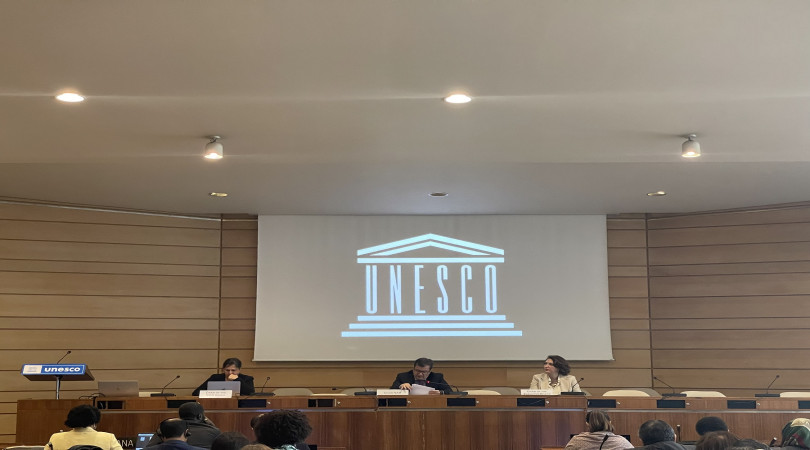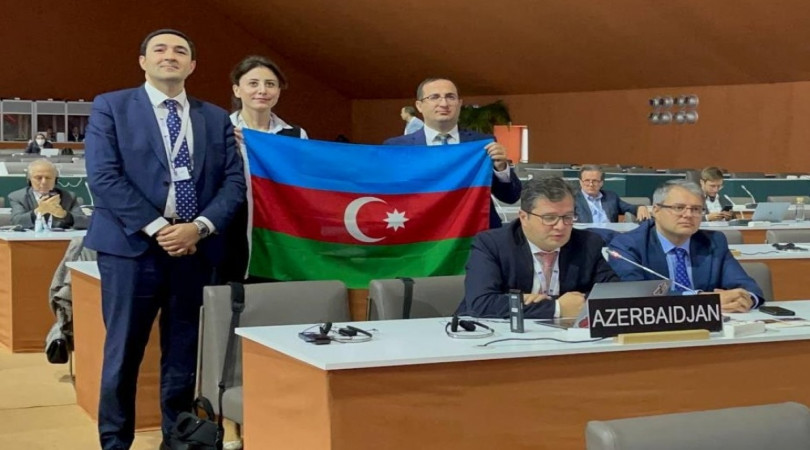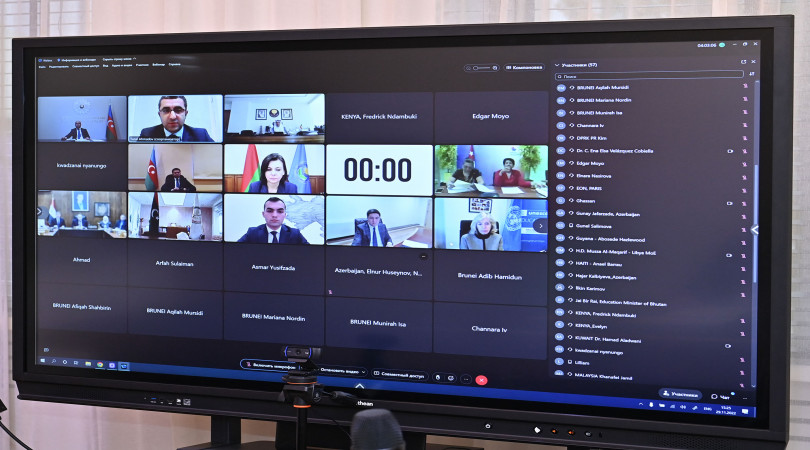UNESCO Anniversaries programme
The list of anniversaries of historic events and of eminent personalities celebrated by the Republic of Azerbaijan
with which UNESCO is associated
1995: 500th anniversary of the birth of the poet Fuzuli (Muhammed ibn Siileyman)
A major figure of the classical school of Turkic literature, Fuzuli was a very prolific author. His poetry was written in the Azeri, Arabic and Persian languages. Fuzuli’s fame extends over a large geocultural area, including the Islamic world where his famous love story of Leyla and Mecnun is very popular.
1998: 1300th anniversary of the epic Azerbaijani legend Kitab-i Dede Qorqud
A collection of a number of tales in prose, interspersed with verse passages, the oldest surviving specimen of the Oghuz epic, and one of the most remarkable literary monuments for Azerbaijan proclaiming the universal values of tolerance, and humanism. They are named after the sage, a legendary character who appears in each tale, and refers to the poet-magicians of the shamanistic era covering Azerbaijan, Anatolia and Turkestan. Many scholars worldwide have been occupied with elucidating the historical, literary, linguistic, ethnological, and folklorist aspects that surrounds Kitab-i Dede Qorqud. It is considered as a masterpiece of the Oghuz tribes, and the Turkic speaking peoples, in a pre-Islamic age - between the fifth and seventh centuries.
2001: 800th anniversary of the birth of Nasir ad-Din Toosi
The renowned astronomer, mathematician and philosopher (1201-1272) predicted the position of the Sun, the Moon and various planets. He made a significant contribution to trigonometry and spherical geometry and was active in other areas of science, medicine, ethics and law.
2002: 200th anniversary of the birth of Mirza Kazem-Bey
The work done by Mirza Kazem-Bey (1802-1870) is of worldwide importance, for he was one of the founders of Oriental studies in Russia. As Director of the Faculty of Oriental Studies of the University of Kazan and founder and first Dean of the Faculty of Oriental Studies of the University of Saint Petersburg, he trained such renowned Orientalists as K. Foygt, I. Berezin, N. Ivanov, O. Kovalevsky, D. Mitchell, V. Dittel and A. Popov. Mirza Kazem-Bey was elected a member of the Paris-based Société Asiatique (1850), the American Oriental Society (1851) and the American Philosophical Society (1862).
2005:100th anniversary of the birth of Yusif Mammedaliyev (1905-1961)
Yusif Mammedaliyev (1905-1961) was an eminent scientist who contributed to the development of international research in the field of chemistry. Thus, he is the originator of a method, unique all over the world, of hydrocarbon halogenation, which made possible the industrial production of many synthetic materials. He also elaborated and produced a new process of obtaining a very high quality aviation fuel. One of the founders and presidents of the Academy of Science of Azerbaijan, this scientist also undertook an important activity in the field of education and played a considerable role in the public life of his country.
2006: 100th anniversary of the birth of Latif Husein Kerimov, carpet designer and artist (1906-1991)
The development of ornamental and pictorial carpets in modern Azerbaijan is closely connected with the name of the great carpet designer and people’s artist Latif Husein Kerimov. Scientific chronicler, historian of Azerbaijani carpet art, carpet designer and artist, Kerimov was also a connoisseur of Azerbaijani and Eastern literature and a virtuoso of the naskh and nastaliq styles. Using his profound knowledge of traditional ornamental art, he created new decorative motifs. Kerimov founded the State Museum of Azerbaijani Carpet and Applied Arts, which opened in Baku in 1967. He was also involved in organizing two international UNESCO sponsored symposiums, “Oriental Carpet Art” and “Azerbaijani Carpet Art”, held respectively in 1983 and 1988 in Baku. Kerimov’s unique works were exhibited in many countries. He carried out extensive research in the field of applied decorative arts. His creations and his erudition both contributed to the diffusion of Azerbaijani culture, and he was one of the most celebrated intellectuals in the East.
2008: 100th anniversary of the first opera in the East:“Leyli and Majnun”
The opera "Leyli and Majnun" was premiered in the Taghiyev Theater in Baku on 12 January 1908. The work became identified as the "First Opera of the Muslim East". The plot, based on an immortal love story, can best be compared to "Romeo and Juliet", though in the oral tradition the legend of "Leyli and Majnun" predates Shakespeare by more than a thousand years. Uzeyir Hajibeyov (1885-1948) was the composer of this opera. He was 22 at the time of its premiere. He and his younger brother, Jeyhun (1891-1962), wrote the libretto based on the poetic rendition of "Leyli and Majnun" by the Azerbaijani poet Fuzuli (1480-1562). Many of the verses were kept in their original form. The "Leyli and Majnun" opera is based on traditional Azerbaijani mughams, which are performed in their original form. Entire segments of the opera feature specific mughams, depending on the emotional effect the composer was trying to convey. The mughams called Mahur-Hindi, Segah, Chahargah, Kurd-Shahnaz, Bayati-Shiraz, Shushtar, Bayati-Kurd, Shabi-Hijran and Gatar are among those featured in this opera.
2008: 100th anniversary of Musa Aliyev, geologist (1908-1985)
Musa Aliyev was a prominent scientist in the field of geology, palaeontology and
biochemistry and his works contributed to the development of the world's science. His works were published in Azerbaijan, but also in Mexico, Egypt and Lebanon.
2008: 100th anniversary of the birth of Mir Jalal Pashayev, writer (1908-1978)
Mir Jalal Pashayev (1908-1978) is recognized as both writer and literary critic. He was one of Azerbaijan's most gifted short story writers when it came to satirizing Soviet bureaucracy. A professor of literature at Baku State University, he wrote hundreds of short stories during his spare time. Seventy of his books are in print. Some have been translated into French, Czech, Persian, German and English. He also co-authored the three-volume, History of Azerbaijani Literature (1957-1960). His most wellknown books include: Resurrection Man (Dirilan Adam, 1936),Manifest of a Young Man (Bir Ganjin Manifesti,1938), Where Are We Going?(Yolumuz Hayanadir, 1957) and People of the Same Age (Yashidlar, 1984).
2009: 100th anniversary of the birthof Sattar Bahlulzade, artist (1909-1974)
Sattar Bahlulzade (1909 - 1974) is the founder of modern Azerbaijani landscape painting. He began his professional education at the National Art Institute in Baku (1927-1931). In 1933, he studied in the Drawing Department at the Moscow Fine Arts Institute. He developed his own impressionist style to express his emotional feeling. Bahlulzade described his own works as paintings of big lyrical landscapes and pictures with the singing of the nature of his native country. His major talent was landscape painting. He loved to travel around his country – Azerbaijan – exploring its beauty, which was the source of his inspiration. Many of his works depict specific areas of Azerbaijan. Sattar Bahlulzade won many prizes. He received the title of Honoured Art Worker of the Republic of Azerbaijan in 1960 and was named People’s Artist in 1963. His works have been exhibited all over the world, including personal exhibitions in the United States of America, United Kingdom, Turkey and Russia. He also created around 30 sketch diaries that contain his reflections on life and art.
2013: 100th anniversary of the musical comedy Arshin Mal Alan of Uzeyir Hajibeyli (1913)
Arshin Mal Alan is the third and last musical comedy of the great Azerbaijan composer Uzeyir Hajibeyov, founder of the national composers’ school, and author of the first eastern opera.He completed his work Arshin Mal Alan, which is close to the comic opera genre, in the summer of 1913, in St. Petersburg. Its depth of images and development level makes it a major and innovative musical and scenic form.
2013: 900th anniversary of achievements of Mahsati Ganjavi, poetess (12th century)
Mahsati Ganjavi was a 12th century poet, born in Ganje, Azerbaijan. She received an education closely acquainted with Eastern literature and music.
Mahsati Ganjavi was a famous rubai writer recognized not only in her epoch but much later also. Her most productive period of creation was spent in the palace of Sultan Mahmud Seldjuk and that of his uncle Sanjar Seldjuk. Mahsati Ganjavi commonly wrote rubai in Persian. The love plot holds the main place in her creations. The rubais are marked out by their worldliness, humanism, epicurism and optimism. Mahsati Ganjavi describes love as a fragile natural feeling which makes a man's fame higher. The poetess protested against religious prejudices, hypocrisy, conservatism and protected a man’s moral freedom. Her poems reflected the people’s, especially women’s, romantic dreams of a free and happy life.
2013: 550th anniversary of the death of Seyid Yahya Bakuvi (Shirvani), philosopher and poet (ca. 1390s-1463)
Founder of the Khalvatiyyah order, which is an important Sufi movement known for its strict ritual training of its dervishes and its emphasis on individual asceticism and retreat. This philosopher disseminated his movement worldwide. Today, his Mausoleum is very famous in the Old City of Baku (Icherisheher), which is now a World Heritage Site.
2014: 600th anniversary of the compilation of Maqāsed al-Alhān, work in the field of musicology (c. 1414) (with the support of Azerbaijan and Turkey)
The Maqāsed al-Alhān is a prominent work in musicology which is a reference book to the traditional music of its era. It covers vast region, including Caucasus, Middle East and Central Asia. It is written by prominent musicologist of Azerbaijani origin Abdelqader Maraghi (1360-1435).
2014: 1100th anniversary of the death of Ahmad AI-Bardiji, philosopher and scholar (834-914)
The work of Ahmad Al-Bardiji related to religious tradition and dialogue and contributed to Islamic historiography, law and ethics. Highlighting the historiography of Islam and promoting universal ethical principles should serve to strengthening the mutual understanding between different religions. UNESCO’s association with this anniversary is in line with one of its main missions – promoting intercultural dialogue and safeguarding diversity of cultural expressions.
2014: 100th anniversary of the birth of Ilyas Afandiyev, writer and playwright (1914-1996)
As the author of more than 80 works, including plays, novels, short stories and essays Ilyas Afandiyev was well known in foreign audience. His works show the realities of life, social issues, family issues, intergenerational relationships, as well as the way out of the situation and problems. The heritage of Ilyas Afandiyev is still alive and studied in many institutions and research centers. This proposal is an example of outstanding life of a writer and poet who contributed to the promotion of principles of cultural diversity, tolerance and respect between people.
2015: 200th anniversary of the German translation of Kitabi Dede Qorqud and its publication (co-organized with the national commissions for UNESCO and permanent missions of Azerbaijan, Turkey, Kazakhstan and Turkmenistan, and with the support of the International Turkic Academy).
Kazakhstan, Kyrgyzstan, Turkey, Turkmenistan, Uzbekistan and Russian Federation.
Dede Korkut is a legendary fatherly figure, whose epic story both of 13-14th centuries is recited throughout the Turkic world. Dede Korkut’s tales convey the society’s inherited identity, ethical values, principles and customs from generation to generation as a symbol of the culture, social lifestyle and pre-Islamic codes and beliefs of the nomadic Turkic tribes. The book's narrative constitutes an important part of overall cultural heritage of Turkic states and communities. Since early 18th century, the Book of Dede Korkut has been translated into French, English, and Russian. H.F. Von Diez, who published a partial German translation of Dede Korkut in 1815, based on a manuscript found in the Royal Library of Dresden, that Dede Korkut became widely known to the West. Another 200-year old copy is maintained at the Archives of the Vatican.
2017: 600th anniversary of the death of Nasimi , poet (1369-1417) (with the support of Kazakhstan, Iran and Turkey)
The great poet has left vast and precious poetic legacy in Azerbaijani, Persian and Arabic languages. His poetry has made a significant impact on the development of Azerbaijani as well as Ottoman Turkish poetic languages over the centuries. The ideas of free spiritual choice and principle of universal love guided the poet towards tolerance, looking above the boundaries, seeking the image of God hidden in every single human being. In this sense his perseverance, moral fortitude, along with intricate interplay of crystal clear language and most abstract and hermetic metaphors has made this personality one of the prominent figures in the Islamic poetry and worldwide literature. Nasimi’s death stands for many centuries for a symbol of suffering for the humanistic ideals.
Considering that Nasimi’s life and poetry had a significant impact on development of whole set of humanistic values in the region, the commemoration events will contribute to UNESCO's mission on promotion of mutual understanding, tolerance and culture of peace.
2017: 200th anniversary of German settlements in the South Caucasus Region (Migration of the Schwab Germans to Azerbaijan and Georgia) (Azerbaijan and Georgia, with the support of Germany)
Beyond the celebration of German settlers in Azerbaijan and Georgia, this anniversary outlines a relevant aspect of the encounter among peoples from different cultural and religious backgrounds and the interaction that emerged, that will be celebrated with commemoration events in Azerbaijan, Georgia and in Germany. In the context of globalized and increasingly diverse societies with growing challenges to peaceful coexistence, this celebration carries a strong message of openness to the Other, of tolerance and respect of diversity and difference. It will particularly contribute to promoting intercultural and interreligious dialogue for better mutual understanding and peace, echoing in this regard the objectives of the International Decade for the Rapprochement of Cultures (2013-2022), for which UNESCO is the lead United Nations agency.
















